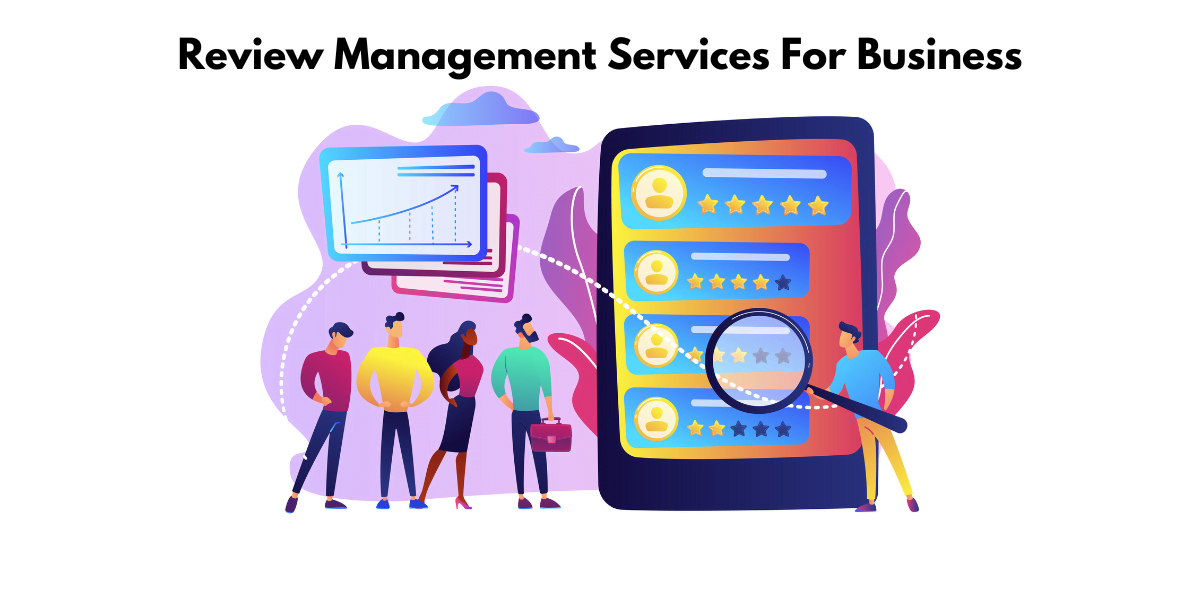What are review management services?
Review management services are an essential element of digital reputation management, which helps businesses to monitor, analyze, respond to, and generate reviews across various online platforms.
This includes the following:
- independent review sites
- ecommerce marketplaces
- social media
- search engines
- blogs
- forums
Review management companies typically manage reviews from over 100 sites and use review management software to automate requesting and generating customer reviews.
What does reputation management service include?
Reputation management services include PR, review management, content creation and distribution, and social media services.
PR services help create a positive image of the brand, review management services help collect, analyze, and manage customer reviews, and content creation and distribution help present yourself and your company in a positive light.
Social media services include the creation and management of social media accounts.

What are the types of online reputation management services?
Online reputation management services are essential for businesses and individuals to monitor and maintain a positive public image.
While public relations has been the oldest reputation marketing tool for creating a positive image of a brand, modern reputation management services involve a more comprehensive set of tools.
These services include the following:
- review management
- content creation and distribution
- social media service
- search engine optimization (SEO) optimization
By leveraging these services, businesses, and individuals can ensure that positive content about their brand is visible on search engine result pages and that negative comments or reviews are minimized or eliminated.
1. Review management
Review management is the process of monitoring reviews left online about your business across various websites.
This ensures you can execute your review response strategy, resolve customer issues as they arise, and quickly remove fake reviews before they cause any issues.
On the other hand, online reputation management is a broad term encompassing several strategies used to maintain and improve a business’ reputation.
Reputation management includes monitoring social media conversations, an optimized and accurate Google My Business profile, search results, and review sites.
Review management is one specific part of reputation management and can help a business gain more organic traffic, thereby increasing sales and revenues.
Responding to reviews, deleting fake reviews, and showcasing the strongest, most recent reviews on the website are some of the core elements of an effective review management strategy.
However, reputation management goes beyond reviews to encompass other strategies, such as content creation, social media management, and online monitoring.
2. Reputation management
Reputation management is safeguarding and promoting a positive online image for an individual, company, or organization.
It involves creating the best possible online presence for the brand, including:
- review generation
- survey campaign management
- reputation monitoring
- social media follower growth services
- review marketing
- search engine optimization (SEO)
- reputation management
- online reputation repair
Online reputation management (ORM) is similar to reputation management, but it specifically monitors what people say online, such as on review sites, forums, groups, or social media.
Reviews play a major role in a brand’s online reputation, so ORM services focus on acquiring and managing reviews to maintain a good reputation.
It also involves strategies to push undesirable stories and reviews off the first few pages of search results.
ORM services also monitor the web to ensure the reputation stays positive and that the business can respond immediately when anything negative pops up. In short, ORM is a subset of reputation management.

3. Removal of unwanted content
We offer various content removal services designed to help protect and restore your reputation.
Review management services can target negative information, images, and social media content, allowing you to control the digital narrative and improve your online visibility.
4. Social media marketing
Social media marketing is an essential part of online reputation management.
It involves creating and maintaining a positive presence on popular social media platforms like Facebook, Twitter, and Instagram.
This helps to create a strong online presence that can positively influence public opinion about a business or individual.
Social media marketing can include creating engaging content, engaging in conversations on social media, managing reputation, and monitoring negative comments and reviews.
These activities help shape the public’s perception of a business or individual by emphasizing positive messages and responding to negative comments or reviews.
Social media marketing can also spread positive content about a business or individual, promote products and services, and direct people to the business’s website or other online platforms
5. Search engine optimization
Search engine optimization (SEO) is integral to online reputation management.
SEO helps ensure that your content has the right keywords, metadata, headlines, and other features to give it the best chance of being seen when people search for your business or businesses in your industry.
Optimizing content for search engines also helps suppress negative search results and build an online reputation you can control.
SEO reputation management strategies involve the following:
- optimizing for specific keywords and phrases
- utilizing keyword research to determine the best keywords to target
- creating content around those keywords
- monitoring the performance of the content on search engine result pages
SEO reputation management also helps to ensure that your website appears higher in search engine rankings, which can help to boost your brand’s visibility and attract more customers.
Additionally, SEO reputation management can help to increase customer lifetime value and loyalty, as it can showcase your commitment to customer satisfaction and build stronger client relationships.
By optimizing content for search engines, businesses can ensure that they have a strong online presence, leading to improved business success.

6. Brand monitoring
Brand monitoring is a critical component of online reputation management.
It involves monitoring, analyzing, and responding to online conversations about your brand, typically through a dedicated online platform.
It helps you remain aware of what people say about your business and its products or services and respond quickly to negative feedback before it escalates.
Brand monitoring is important to digital success.
It allows you to do the following:
- appeal to high-intent prospects
- generate positive reviews
- increase customer lifetime value and loyalty
- attract high-performing employees
- improve your bottom line
- boost your SEO efforts
It can also help you manage customer expectations and highlight customer service issues.
Brand monitoring and reputation management go hand-in-hand.
Reputation management involves responding to brand mentions, while monitoring lets you stay on top of your brand mentions and search results.
Both are necessary to maintain a positive reputation and ensure your business is accurately represented online.
7. Customer feedback surveys
Customer feedback surveys are an important tool for online reputation management.
Through customer feedback surveys, businesses can gather valuable insights into how their customers view their products and services.
This information can then be used to identify areas of improvement, address customer complaints, and improve customer satisfaction.
The data gathered from such surveys can also be used to determine how customers feel about the overall customer service experience, branding, and marketing efforts.
By understanding customer sentiment, businesses can make more informed decisions that will ultimately increase customer loyalty and improve online reputation.

8. Paid advertising
Paid advertising is an important part of online reputation management services, as it can help promote positive content and drown out negative content.
Proactive reputation management uses paid advertising to guide the brand story.
This could include placing ads, sending out press releases, or engaging in public relations.
On the other hand, reactive reputation management is more concerned with responding to what others say about your brand and includes tracking brand mentions, monitoring search results, and responding to customer reviews.
Paid advertising can be a powerful tool to help support a more positive reputation.
It can be used for content creation, review, and social media management services.
9. Brand image building
Brand image building creates and maintains a positive public perception of a brand or company.
It involves actively managing online reputation to ensure that when potential customers search for your brand or company, they will find positive information and reviews.
This can be done through various strategies such as SEO marketing, content marketing, social media management, and reputation management.
By building a strong online brand image, businesses can gain the trust of their customers and establish themselves as thought leaders in their respective industries.
Additionally, a positive brand image can help businesses to increase customer loyalty, attract more prospects and generate more sales.
10. Business directory listings
Business directory listings can play a major role in the overall strategy of online reputation management.
The listings help bolster a company’s visibility to potential customers and provide important information about a business.
Business directory listings are especially useful for small businesses, as they can help garner local search engine attention and build a local customer base.
Most online reputation management services offer some type of business directory listing service.
Business directory listings are an important part of an online reputation management strategy.
Companies should consider their needs and goals to determine the best service.

8 reasons why you should get review management services for your business
In today’s digital world, an online presence is essential for businesses of all sizes and industries.
With online reviews becoming increasingly important for consumer decisions, online review management services are invaluable for any business.
Professional online review management services offer numerous advantages, from expanding franchises to local businesses and mid-sized companies launching international ventures.
By partnering with an online review management company, businesses can use the expertise and experience of the company to manage reviews, leverage them to boost sales, and optimize the time of their team, allowing them to focus on high-priority tasks.
Ultimately, businesses can improve their services, create a better product experience for everyone, and earn more authentic reviews from satisfied customers.
1. Reviews are one of the best ways to measure the reputation of a business
By getting review management services, businesses can measure the reputation of their business by actively managing their reviews and responding to both positive and negative feedback.
Research has indicated that businesses can increase their revenues by 5-9 % for every 1-star improvement in the ratings.
This helps attract new customers and mitigate any negative impacts of negative reviews on the business’ reputation.
In addition, businesses can use positive reviews as user-generated content (UGC) in their marketing materials, which highly impacts customers.
Review management is essential to any business’ reputation management strategy.
2. Reviews help potential customers determine whether or not they want to do business with a business
Getting a review management service can help potential customers determine if they want to do business with a business by giving them an understanding of what people are saying about that business online.
Reviews can influence potential customers’ buying decisions and give them an overview of what to expect when doing business with a company.
Seeing a business’ positive reviews can make them more likely to purchase from the business, while seeing negative reviews can make them less likely to consider the business.
By actively monitoring reviews, businesses can ensure they put their best foot forward and create a positive first impression with potential customers.
3. Reviews help build trust between a business and its customers
Review management helps build trust between a business and customers by ensuring that customers only see genuine reviews that reflect their experiences.
This sets their expectations correctly and guides their decision, ensuring their money won’t go to waste.
By responding to reviews quickly and elegantly, businesses show that they care about customer experiences and are willing to take the time to make things right.
Online reviews serve as social proof for potential customers, indicating that others have already had positive experiences and that the business is legitimate and reliable.
4. Reviews can impact a business’ search engine visibility
Reviews can have a significant impact on a business’ search engine visibility.
Reviews are important ranking signals that tell search engines whether a business is trustworthy and, thus, whether it should be featured high in search results.
When customers post reviews, Google takes this as evidence that the business values its customers, and as a result, these businesses are rewarded with a higher ranking.
Additionally, responding to reviews quickly is an engagement signal for Google, increasing visibility.
Negative reviews can drastically reduce a business’ visibility, as almost 90% of customers are turned off by negative reviews and will often choose to go to a competitor if they see bad business reviews.
In conclusion, reviews play an important role in a business’ search engine visibility, and monitoring and responding to reviews can help businesses gain an SEO advantage.
5. Reviews can affect a business’ conversion rate
Online reviews can have a significant effect on a business’ conversion rate.
Research suggests that customers are more likely to purchase from a business with positive online reviews, with one study reporting an increase in sales of up to 22% when a business has more positive reviews.
Furthermore, customers are more likely to trust a business with positive reviews, as nearly 88% of online readers trust what reviews have to say as much as they would a real-life recommendation.
Negative reviews can also harm a business’ conversion rate, as 92% of customers are likely to be put off by negative reviews and may even change their minds about a purchase based on what they’ve read.
As online reviews are often the first thing potential customers see before making a purchase decision, companies must ensure that their reviews are managed effectively and accurately reflect the quality of their services.
Doing so can help attract more customers and ultimately increase the business’ conversion rate.
6. Reviews can affect a business’ profitability
Reviews can significantly impact a business’ profitability for many reasons.
Research suggests that customers will read online reviews before making a purchase, and these reviews can lead to an increase in sales of up to 22%.
When there is a choice between two equally good products, the one with more positive reviews is more likely to be purchased.
Review management services can help businesses better understand what people say about their company online and give them the tools they need to improve their online reputation.
It is also important for businesses to address any negative reviews to mitigate any negative impact they might have on their reputation.
In conclusion, reviews can majorly impact a business’ profitability, as they can attract new customers, increase sales, and improve the business’ overall reputation.
Investing in review management services is essential to any successful business and can help businesses reach their desired goals.
7. Reviews can affect a business’ customer loyalty
Reviews can have a major impact on a business’ customer loyalty.
Responding to customer reviews is also an important part of managing customer loyalty, as it helps mitigate the impact of negative reviews and shows that you care about customer feedback.
Furthermore, encouraging customers to provide proactive reviews can also help build customer loyalty, as customers appreciate your effort to ensure they have the best experience possible.
Ultimately, reviews can majorly impact a business’ customer loyalty and should be managed appropriately to ensure customer satisfaction and loyalty.
8. Reviews can affect a business’ brand image
Online reviews can have a huge effect on a business’ brand image.
Positive reviews can help create a favorable impression of the business, increasing customer trust and loyalty.
Conversely, negative reviews can damage a business’ reputation, decreasing sales and customer dissatisfaction.
Consumers rely heavily on reviews when deciding where to shop, what to buy, and where to spend their money.
Studies have shown that 70% of customers read multiple reviews before making a purchase, and nearly half won’t even consider a business with a rating of fewer than four stars.
This means that businesses need to actively monitor their online reputation and be ready to address any negative reviews promptly.
In addition, surveys suggest that positive reviews can lead to an increase in sales of up to 22%. Investing in reputation management can help ensure that your business meets customers’ needs and creates a positive online brand image.
- Unlocking Growth: The Power of Customer Experience Analytics in Boosting Retention and Driving Business Success - June 3, 2024
- Online Credibility: Advanced Digital Reputation Management Solutions - January 11, 2024
- 8 Reasons Why You Should Get Review Management Services for Your Business - June 12, 2023







